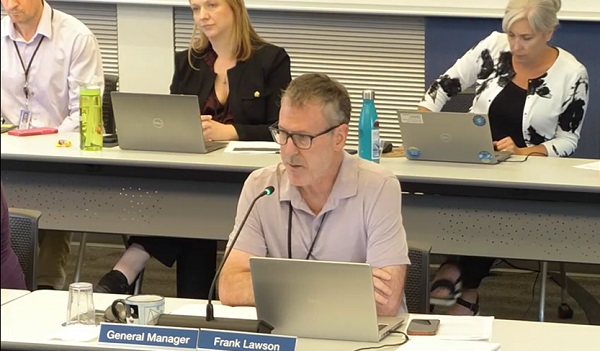EWEB to charge Eugene more for its stormwater, wastewater billing
4 min read
Presenter: What Eugene’s city manager calls ‘the cost of money’ is about to go up. To explain her use of the term, here’s Sarah Medary during budget discussions May 14:
Sarah Medary (Eugene, city manager, May 14, 2025): You know, when I talk about the cost of money, one of the biggest challenges we’re going to have is: How are we going to bill for this additional fee?…
[00:00:19] When we start thinking about collecting a fee, we know that there’s going to be a cost to implement that. There’s some one -time costs, and then there’s going to be an annual cost. So regardless of whether we use a current billing partner or we bring in a new billing partner, we’re going to have to pay for that one time to set it up and annually and I predict it’s going to be close to a million dollars to set it up and it’s probably going to be a million or more to collect it annually. That would be in line with some of the numbers we’ve already seen.
[00:00:52] Presenter: On May 21, Assistant City Manager Matt Rodrigues:
[00:00:56] Matt Rodrigues (Eugene, assistant city manager, May 21, 2025): Let’s talk a little bit about the temporary stormwater fee increase… This is just basically an increase to the current rate, so there’s no change in methodology. It uses the one that’s in place. In order to generate $4.7 million, it’s about an 18% increase in the stormwater fee.
There’s no additional collection costs because this is already billed on our behalf by EWEB. We already pay them a per-a-bill fee that would not change because it’s really just a dollar amount going up, not anything else that would be different on their bill.
[00:01:29] Presenter: It turns out that the truth of that statement did not survive the summer break. The city and EWEB are discussing a fairly significant increase to that per-bill fee. It’s going from $1.97 to $3.48. At the Sept. 2 meeting of the EWEB board, General Manager Frank Lawson:
[00:01:50] Frank Lawson (EWEB, general manager): The other item of correspondence is the preview of the intergovernmental agreement with the city of Eugene around billing services. This is specific not to any sort of new fee, but the costs—and this is cost-based—of the billing of the stormwater and wastewater fees. And so there’s an increase of that that has been presented to city staff. And that would come back to this board for approval on consent calendar next month.
[00:02:19] Presenter: Commissioner John Brown:
[00:02:21] John Brown (EWEB, commissioner): Question if I may about that topic? So it looks like we were billing $235,000 and now it’s over $1 million. So are we off or I mean, how did that disparity happen? Because if we should have been billing $1 million all along, and we’re only billing them $235 (thousand), how long has that gone on and is there any chance of us go back and and recover that.
[00:02:43] Presenter: General Manager Frank Lawson:
[00:02:46] Frank Lawson (EWEB, general manager): So two things. First of all, I think it’s going from about $1.2, little under $1.2 million to almost $2.5 million. Some of that is based on the cost allocation, the greater percentage of the bill, the greater the allocation of those costs and also how the numbers on the customers are and as we go through and we update the billing determinants, those get updated. It is cost-based.
I don’t believe the previous agreement called for any kind of retroactive adjustment. But if there’s more detail, I can lean into either Deborah Hart or Julie McGaughey, who were part of the discussions.
[00:03:31] John Brown (EWEB, commissioner): No, I just was curious. That seemed like a pretty big disparity from where it was and where it is. And knowing that they don’t have any money, I’m just wondering how that’s going to be received…
[00:03:41] Frank Lawson (EWEB, general manager): Well, staff that was presented this information, I’m not going to say it was okay with that, there wasn’t an objection. I would also say that how they do their billing, the gross versus net, would likely get built into their fee process.
[00:03:59] And so, and if there was anything I missed, Deborah, on what drove the cost increase. Deborah, Julie? I’m looking over both shoulders.
[00:04:10] Presenter: Chief Financial Officer Deborah Hart:
[00:04:13] Deborah Hart (EWEB, chief financial officer): There were a few things. One was a more comprehensive collection of our costs, specifically as it related to billing rather than focusing just on the folks who answered questions by phone and in our lobby.
[00:04:29] And we’ve also seen a significant increase in merchant services fees, the fees that are associated with taking credit card payments. And we’ve more closely aligned the city’s portion with the portion of revenue that we collect on their behalf. So those were two big drivers.
[00:04:48] John Brown (EWEB, commissioner): Thank you.
[00:04:50] Presenter: The cost of money is going up. Your future EWEB bills could be even higher than we were told.





